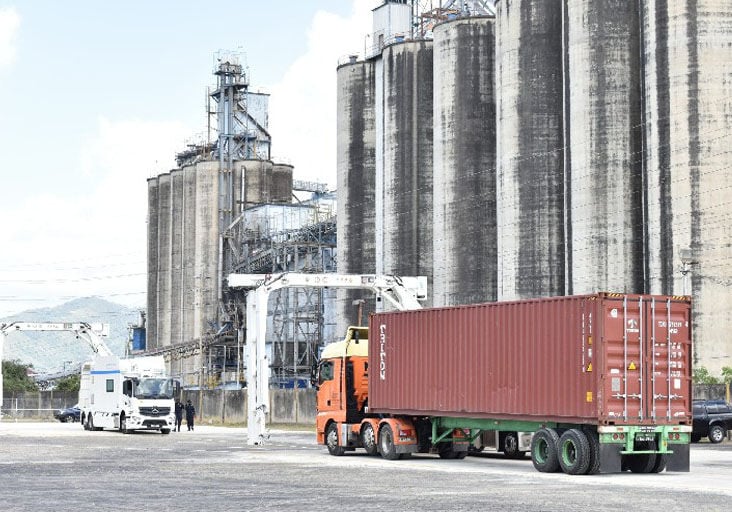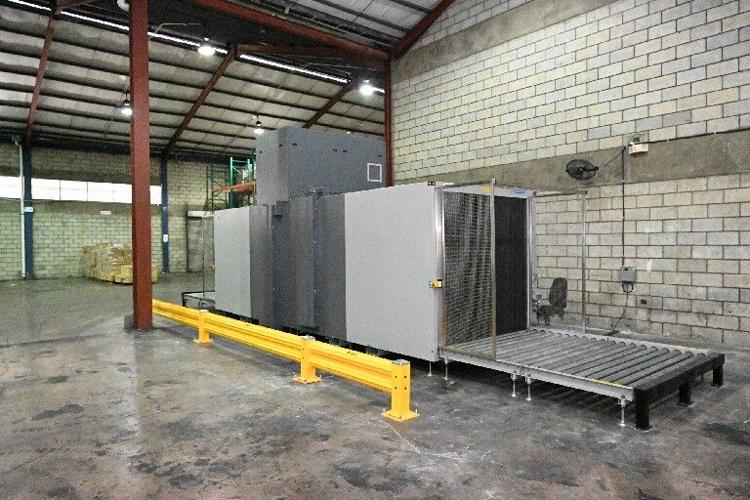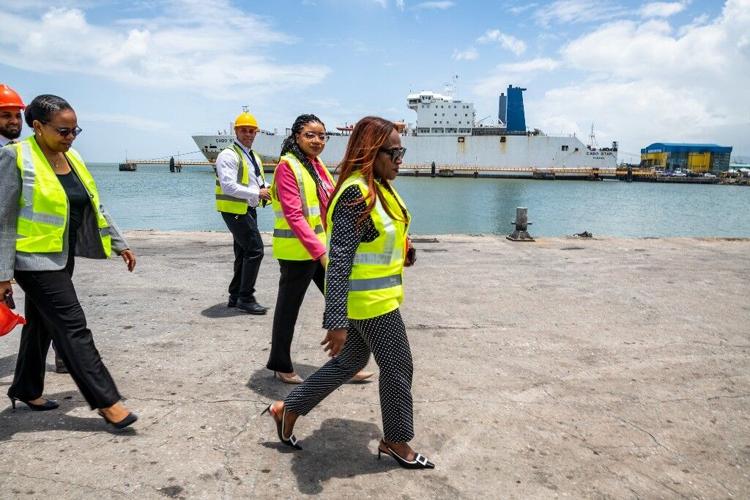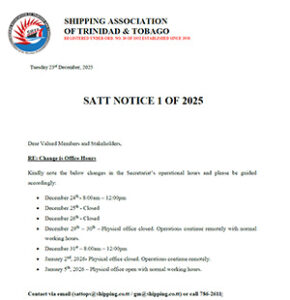
TRANSIT shed operators (TSOs) say they remain committed to national security, but face significant operational and financial strain following what they describe as an abrupt, poorly coordinated enforcement of a Customs and Excise Division mandate requiring the use of non-intrusive inspection (NII) scanners.
This is according to a source familiar with the matter, who spoke to Express Business on condition of anonymity.

“At the outset, let me state that all TSOs collectively support the need for enhancing national security measures to protect our nation’s borders. We have repeatedly communicated this position since receiving notice of Customs and Excise Division’s mandate in mid-2023, but advocated for more constructive measures and efficient alternatives towards achieving the same.”
The source revealed that, as of May 1, 2025, four of the 11 registered transit shed operators (TSOs) have been deemed non-compliant by Customs due to the absence of non-intrusive inspection (NII) scanning facilities. These operators are International Shipping Ltd, Medway Ltd, the Port of Port of Spain, and Point Lisas Industrial Port Development Corporation Ltd (PLIPDECO).
The remaining seven TSOs in compliance are Amerijet, ABL Ltd, Aeromarine Ltd, Caribbean Airlines, PAS Trinidad Ltd, Swissport, and Websource.
The source explained that Less than Container Load (LCL) cargo accounts for approximately 15% of all imports entering Trinidad and Tobago’s official ports. However, the four non-compliant TSOs are responsible for handling more than 60% of that LCL volume and, due to Customs restrictions, are now operating at just 15% of their usual capacity.

“These four non-compliant TSOs manage over 60% of the country’s LCL throughput. Of the remaining seven compliant TSOs, four—Swissport, Amerijet, Caribbean Airlines, Websource—traditionally handle primarily air freight cargo. Amerijet is one of these four which suffered a major fire a few weeks ago and is not operational. They are presently sharing operations at Swissport, which is causing inevitable delays.”
The source expressed concern over the lack of consultation prior to the mandate’s enforcement, as well as the absence of standard operating procedures (SOPs) for the use of NII scanners.
“Customs and Excise Division officers at compliant TSO facilities have admitted to the absence of SOPs and resulting procedural uncertainties. Unrealistic immediate expectations to examine 100% cargo deposited at transit sheds has resulted in significant bottlenecks. No practical interim contingencies provided for non-compliant TSO facilities nor communicated contingencies for scenarios where NII Scanner equipment failures.”
The source noted a growing imbalance between national security measures and trade facilitation needs, pointing out that private TSOs shoulder significant costs for equipment investment and maintenance—unlike their State-owned counterparts.
Following a policy shift on May 2 that significantly reduced TSO operational flexibility, industry stakeholders proposed a series of immediate measures aimed at easing the resulting disruptions:
• Under a controlled framework, allow TSOs to resume operations with Customs oversight, using moderately enhanced inspections.
• Scan all containers at ports using mobile scanners prior to arrival at TSOs—delivering the same security outcomes without crippling delays.
• Establish a temporary waiver for non-compliant TSOs to allow time for compliance or reassessment of the policy through stakeholder input.
“These proposals are aimed at restoring efficiency without compromising security, and at re-establishing a functional working environment for TSOs and importers in the short term,” they stated.
When asked what meaningful consultation would entail, the source said it must go beyond mere notifications to include early engagement and genuine dialogue. However, they added, “This did not happen.”
They outlined what proper engagement would involve:
- • Timely notice of procedural changes—“which Customs did, but in a very top-down announcement format, with no meaningful room for compromise or incorporation of useful feedback.”
- • Roundtable discussions with Customs, line ministries, TSOs, port operators, freight forwarders, and private sector representatives.
- • Transparent sharing of data and rationale behind decisions.
- • A clear feedback mechanism and follow-up communication.
“Although initial steps were taken to create the appearance of consultation, in practice the process reflected a unilateral approach by Customs, with limited genuine input from stakeholders,” they said.
“For example, we were told that the mobile container scanners do not scan to an acceptable level, but when asked for the data to support this assertion, we were told to do our own studies at our expense. When we requested an SOP for how this new process would work, we got a comment that one existed, but none was provided. When asked for feasibility studies for how well the process works, or has worked, and the effect on throughput, we were told to conduct our own feasibility studies at our expense.”
The source said the imbalance in implementation is already creating wide-ranging negative effects:
- • non-productive downtime, idle labour, and revenue losses
- • delays in cargo clearance and increased logistics costs
- • missed delivery deadlines for importers and the risk of stockouts
- • accumulated rent and demurrage charges
- • cost increases that will likely be passed on to consumers
- • strained relationships with clients due to prolonged delays
- • risk of smaller TSOs being pushed out, worsening bottlenecks.
“When trade facilitation is not given sufficient weight, the economic cost to businesses—and by extension, consumers—rises sharply,” they stressed.
To provide immediate relief, the following measures were proposed:
- • restore normal cargo clearance volumes with minimal appointment reductions
- • apply discretion for low-risk commercial cargo
- • resume the usual flow of unstuffing and PTR approvals to maintain cargo movement
- • temporarily scan full containers at the ports to prevent delays
- • grant temporary exemptions or expedited clearance for low-risk traders
- • urge ports and shipping lines to waive or reduce storage and demurrage fees
- • reactivate stakeholder engagement channels for real-time problem-solving.
The source warned that unresolved issues could lead to long-term damage:
- • increased cost of goods
- • declining investor confidence in T&T’s trade reliability
- • loss of competitiveness to other regional hubs
- • slower economic activity, especially among LCL-dependent sectors
- • threats to viability of local businesses.
“Without timely and strategic intervention, what began as a procedural issue could evolve into a broader national economic challenge.”
The source added that on May 5, just days after enforcement began, a TSO equipped with an NII scanner experienced a breakdown that halted scanning for five business days. That facility handles a significant portion of the remaining 40% of LCL cargo — further exacerbating the backlog.
According to industry estimates, the current wait time from container arrival to unstuffing averages ten to 12 working days. Following that, securing a customs clearance appointment adds another six to eight working days due to limited daily quotas.
“It is important to consider that many small and medium-sized enterprises (SMEs) operate with ‘just-in-time’ inventory management. Such significant delays, coupled with the accumulating storage and demurrage charges, could have severe consequences for these businesses.”
They also noted that ongoing foreign exchange restrictions have led SMEs to import more via Less than Container Load (LCL) shipments rather than full container loads (FCL), making the current delays even more unsustainable.
“This evolving trend underscores the unsustainable nature of the present operational challenges. I’d appreciate the opportunity to review the intended publication so as to ensure there are no misinterpretations,” the source stated.
Minister’s response
Minister of Works and Infrastructure Jearlean John told Express Business she is aware of the challenges facing TSOs and intends to meet with them.
“A meeting will be scheduled with the Transit Shed Operators, as matter of priority,” she said in a WhatsApp response on Monday.
John said that national security remains a top priority for both her ministry and the Government.
“I myself, and by extension this current Government of the Republic of Trinidad and Tobago, deem national security to be top priority. In this regard, the procurement of the pallet scanners for both the Port of Port of Spain and Point Lisas is being addressed with urgency.”
She added that scanning operations are already ongoing at both ports.
“Notwithstanding the above, I would like to remind you that scanning operations for containers are ongoing at both ports: Port of Spain—one fixed container scanner and two mobile scanners; and Point Lisas—two mobile scanners.”
John said she has engaged Finance Minister Davendranath Tancoo and the Comptroller of Customs and Excise to explore an interim arrangement.
“We recognise the importance of maintaining business continuity while enhancing national border security measures. Accordingly, I have already engaged the Honourable Minister of Finance, and the Comptroller of Customs and Excise in discussions, with the aim of implementing an interim solution that will allow operations to continue smoothly while procurement of the required scanning equipment is under way.”
She also noted that TSOs had been formally notified of the new requirements.
“On June 26, 2023, all TSOs were formally notified of the mandatory requirements regarding the implementation of NII equipment for use in all transit sheds.”
John added that Customs and Excise has advised that, as of May 5, 2025, all LCL cargo must be scanned prior to being deposited or stored at any transit shed.
“This scanning is to take place at the point of unloading containers, ensuring cargo is inspected before entering the storage facility. As such, all TSOs are required to install non-intrusive palletised scanners to comply with this directive.”
She also pointed out that a Transit Shed Committee was established in 2023 to facilitate discussion on the implementation process.
“A Transit Shed Committee was established by the Comptroller of Customs in 2023. Meetings were held to discuss the planned implementation,” stated John.





